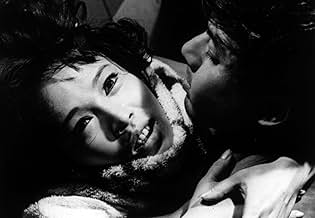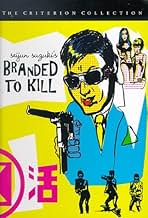IMDb RATING
7.2/10
11K
YOUR RATING
After a botched assignment, a rice-fetishizing hitman finds himself in conflict with his organization, and one mysterious, dangerous fellow-hitman in particular.After a botched assignment, a rice-fetishizing hitman finds himself in conflict with his organization, and one mysterious, dangerous fellow-hitman in particular.After a botched assignment, a rice-fetishizing hitman finds himself in conflict with his organization, and one mysterious, dangerous fellow-hitman in particular.
- Awards
- 1 win total
Jô Shishido
- Gorô Hanada
- (as Joe Shishido)
Annu Mari
- Misako Nakajô
- (as Anne Mari)
Akira Hisamatsu
- Ophthalmologist
- (as Kôsuke Hisamatsu)
Kôji Seyama
- Restaurant Guest
- (as Takashi Seyama)
Featured reviews
A bizarre yakuza flick with a taste for over-the-top visuals and modern stylistics, Branded to Kill follows the strange day-to-day existence of an expert hit-man who carries out his orders with steely determination and impassive cool. All hell breaks loose, however, when a butterfly alighting on his rifle scope results in a botched job -- and a death sentence for the screw-up. Joe Shishido, with his collagen-enhanced cheekbones, makes a terrific anti-hero whose unusual quirks (Suzuki reasoned that a man obsessed with the scent of warm rice would signal to audiences that this guy was quintessentially Japanese) instantly endear him to newly-made fans. Branded to Kill is wild fun, and has been favorably and frequently compared to the work of artists as different as John Woo and David Lynch -- which makes it all the more exhilarating when you realize it was made in 1967.
Much has been made of how weird and off-beat Branded to Kill is. However it is important to consider it as part of Suzuki's progression through film-making. Before you can break the rules, you have to master them. Suzuki did so in several of his earlier pictures, from Underworld Beauty to Tattooed Life. And every time he was called to deliver a run of the mill yakuza flick, he infused it with his personal style. More and more he fractured the visual language of cinema every time, until he got rid of it or transformed it into a psychotic beast for Branded to Kill, revealing what lies beneath.
A plot synopsis would read something like this: Jo Shishido is killer Number #3 with ambitions of becoming Number #1. Who is Number #1? Does he even exist? That is until he's called to transport a client safely. The borders between realism and surrealism blur hopelessly at that point and what follows is a nightmarish concoction of beautiful set-pieces that lead up to his final confrontation with Number #1.
Saying that Branded to Kill is weird is an understatement. In turns fascinating, confusing, nonsensical, surrealist, psychotic, thrilling, poetic, nightmarish, confusing, tiring, mind-numbing and exhilarating, it defies description as much as it defies sense. The boundaries of time, space and logic are blurred and all you can do is experience the ride. It doesn't try to make much sense and apparently Suzuki made it up as he went along. The result was to be fired by Nikkatsu Studios for delivering a picture that "made no sense". I don't blame them really. Studios are businesses and Branded to Kill is not a movie with massive appeal. Ahead of its time in that aspect.
Filmed in beautiful black and white, with a languid jazzy score and a film-noir ambiance, Branded to Kill will certainly appeal to people with strange tastes. Don't go in expecting a yakuza action flick (although there are several gunfights and enough action to go along) or you'll be sorely disappointed. As an indication of the uncharted territories Branded to Kill's treads, I'll guesstimate that fans of Eraserhead-era Lynch, Koji Wakamatsu and Singapore Sling's style will appreciate it. I can't say "like it", because ultimately that's between the viewer and Branded to Kill to sort. Either way, it has to be experienced at least once. Just sit back and let the surreal absurdity of it all wash over you...
A plot synopsis would read something like this: Jo Shishido is killer Number #3 with ambitions of becoming Number #1. Who is Number #1? Does he even exist? That is until he's called to transport a client safely. The borders between realism and surrealism blur hopelessly at that point and what follows is a nightmarish concoction of beautiful set-pieces that lead up to his final confrontation with Number #1.
Saying that Branded to Kill is weird is an understatement. In turns fascinating, confusing, nonsensical, surrealist, psychotic, thrilling, poetic, nightmarish, confusing, tiring, mind-numbing and exhilarating, it defies description as much as it defies sense. The boundaries of time, space and logic are blurred and all you can do is experience the ride. It doesn't try to make much sense and apparently Suzuki made it up as he went along. The result was to be fired by Nikkatsu Studios for delivering a picture that "made no sense". I don't blame them really. Studios are businesses and Branded to Kill is not a movie with massive appeal. Ahead of its time in that aspect.
Filmed in beautiful black and white, with a languid jazzy score and a film-noir ambiance, Branded to Kill will certainly appeal to people with strange tastes. Don't go in expecting a yakuza action flick (although there are several gunfights and enough action to go along) or you'll be sorely disappointed. As an indication of the uncharted territories Branded to Kill's treads, I'll guesstimate that fans of Eraserhead-era Lynch, Koji Wakamatsu and Singapore Sling's style will appreciate it. I can't say "like it", because ultimately that's between the viewer and Branded to Kill to sort. Either way, it has to be experienced at least once. Just sit back and let the surreal absurdity of it all wash over you...
Wow, I thought the Japanese turned out some weird stuff nowadays. That lame crap has nothing on this wacky thing, which requires about 57 viewings to make any kind of narrative sense.
Jo Shishido (who has cheek implants (!!) that make him look like a chipmunk) is the third best killer in Japan. Apparently, all assassins in Japan do, other than kill people, is try to better themselves in the rankings. It's much like Pokemon, in a way. Jo strives to be number one, but, not only does he have to get past a bunch of backstabbers, he has to find the #1 Phantom, the high man on the totem. And when he does, it's rip roarin' nonsense time!
It's hard to tell if this is a work of genius or of pure insanity. There's no real narrative; more like a bunch of scenes held together by the fact they're all in the same movie. Some of the stuff is so nutty, it's hard not to call it brilliant, like when Jo finally does meet Phantom and they have a sit-down, Phantom pisses his pants rather than get up and take his eyes off Jo. Or the hit that gets foiled by a butterfly. Or Jo's girlfriend's obsession with dead bugs, which lay in piles on the floor. Or the shocking amount of sex and violence in a movie made in 1967. It's really no surprise that the director had his contract summarily terminated when the studio watched this: it is the weirdest movie to come out of Japan in 1967. Or maybe ever. Be prepared to watch more than once.
Jo Shishido (who has cheek implants (!!) that make him look like a chipmunk) is the third best killer in Japan. Apparently, all assassins in Japan do, other than kill people, is try to better themselves in the rankings. It's much like Pokemon, in a way. Jo strives to be number one, but, not only does he have to get past a bunch of backstabbers, he has to find the #1 Phantom, the high man on the totem. And when he does, it's rip roarin' nonsense time!
It's hard to tell if this is a work of genius or of pure insanity. There's no real narrative; more like a bunch of scenes held together by the fact they're all in the same movie. Some of the stuff is so nutty, it's hard not to call it brilliant, like when Jo finally does meet Phantom and they have a sit-down, Phantom pisses his pants rather than get up and take his eyes off Jo. Or the hit that gets foiled by a butterfly. Or Jo's girlfriend's obsession with dead bugs, which lay in piles on the floor. Or the shocking amount of sex and violence in a movie made in 1967. It's really no surprise that the director had his contract summarily terminated when the studio watched this: it is the weirdest movie to come out of Japan in 1967. Or maybe ever. Be prepared to watch more than once.
Man, why are those late 60's / early 70's criminal movies so fantastically good? I guess it must have something to do with those old saturated film stocks. If only Kodachrome would muster the courage to bring back what brought us the those classics: Dirty Harry, Bullitt, The Getaway etc.
Or then again, maybe it was just the period in which these movies were made. The hippie era did, as it would appears produced a surprisingly good number of film titles. Comparatively, Branded to Kill reminds one distinctively in style to John Boorman's film of the same year, POINT BLANK, both in choice of film stock and composition of photography, but aside from this the films are completely different. Branded to Kill tells the story of a yakuza hitman (with a penchant for fast woman and inhaling "rice steam") who seeks the desirable title of #1 gunman. But of course, it's not going to be that easy...
Or then again, maybe it was just the period in which these movies were made. The hippie era did, as it would appears produced a surprisingly good number of film titles. Comparatively, Branded to Kill reminds one distinctively in style to John Boorman's film of the same year, POINT BLANK, both in choice of film stock and composition of photography, but aside from this the films are completely different. Branded to Kill tells the story of a yakuza hitman (with a penchant for fast woman and inhaling "rice steam") who seeks the desirable title of #1 gunman. But of course, it's not going to be that easy...
Rice-sniffing, #3 Killer, dead butterflies, snuff films. Where to start? 'Koroshi no rakuin' is a surreal, Kafkaesque, timewarp of a film masquerading as a stylish 60's hit-man movie. Nikkatsu Studios fired Seijun Suzuki over this film's "incomprehensibility."
Suzuki is an auteur of the highest magnitude, nobody has ever used a widescreen, black and white, "Nikkatsu Scope" frame quite like him. The dense and beautifully chaotic images are overwhelming on your first viewing, it's the sort of movie that shows you something new every time you watch it.
Essentially Hanado Goro (Jo Shisido) is the yakuza's #3 Killer, but he desperately wants to be #1. As might be expected, being a hired gun is a stressful life and Hanado takes the edge off with lots of sex and the smell of boiling rice. The sex gets him embroiled in some sort of a plot and he finds himself getting much better acquainted with #1 Killer than he'd ever wanted to be.
Time backs up, swirls around, restarts, slows down. Major themes include, but are not limited to: ambition, lust, rivalry, bureaucracy, addiction, loss of self-control. There's a certain parallel in that with this picture Suzuki derailed his own career as a "salary man" making Nikkatsu yakuza flicks, many of Hanado's thoughts and impulses must have been the director's own.
Suzuki is an auteur of the highest magnitude, nobody has ever used a widescreen, black and white, "Nikkatsu Scope" frame quite like him. The dense and beautifully chaotic images are overwhelming on your first viewing, it's the sort of movie that shows you something new every time you watch it.
Essentially Hanado Goro (Jo Shisido) is the yakuza's #3 Killer, but he desperately wants to be #1. As might be expected, being a hired gun is a stressful life and Hanado takes the edge off with lots of sex and the smell of boiling rice. The sex gets him embroiled in some sort of a plot and he finds himself getting much better acquainted with #1 Killer than he'd ever wanted to be.
Time backs up, swirls around, restarts, slows down. Major themes include, but are not limited to: ambition, lust, rivalry, bureaucracy, addiction, loss of self-control. There's a certain parallel in that with this picture Suzuki derailed his own career as a "salary man" making Nikkatsu yakuza flicks, many of Hanado's thoughts and impulses must have been the director's own.
Did you know
- TriviaWhen Nikkatsu studio executives saw the finished product, they thought it was too terrible to be released, so they shelved it. Seijun Suzuki along with others in the film business, film critics, and students protested in unfairness since, by contract, Nikkatsu was supposed to release the finished film theatrically. It went to court, with a ruling in favor of the director. Nikkatsu had to pay for damages and have the film released. Suzuki's contract with Nikkatsu was terminated, and with the bad reputation, was unable to work on a feature film for the next 10 years.
- Quotes
Misako Nakajô: My dream is to die.
- ConnectionsFeatured in Seijun Suzuki | TCM (2013)
- SoundtracksKoroshi no buruusu (Killing Blues)
Lyrics by Hachiro Guryu (Yasuaki Hangai, Takeo Kimura, Yutaka Okada, Chûsei Sone, Seijun Suzuki, Yôzô Tanaka, Seiichiro Yamaguchi and Atsushi Yamatoya)
Music by Kagehisa Kusui
Sung by Atsushi Yamatoya
- How long is Branded to Kill?Powered by Alexa
Details
- Runtime1 hour 31 minutes
- Color
- Aspect ratio
- 2.35 : 1
Contribute to this page
Suggest an edit or add missing content

























